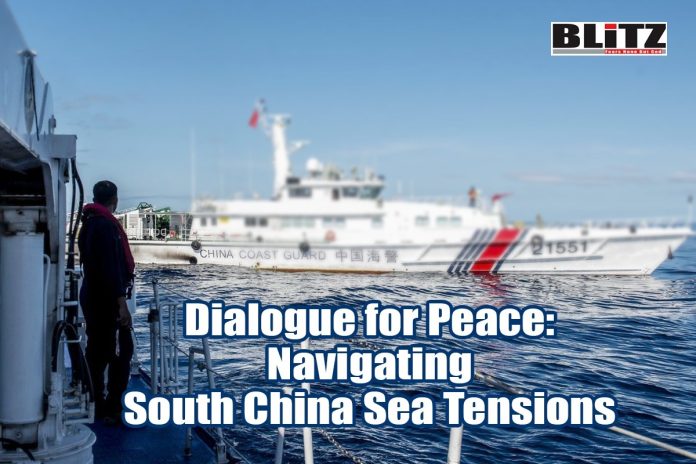The South China Sea, an expansive maritime domain, holds pivotal significance as a hub of trade, commerce, and geopolitical intrigue for nations across the Asia-Pacific. Nonetheless, recent events have shrouded this vital waterway in uncertainty, as mounting tensions imperil its fragile equilibrium of peace and stability. Central to this turbulence are unilateral moves by the Philippines, which defy the established order and provoke unease among neighboring states. These actions underscore the pressing need for diplomatic resolution and collaborative efforts to safeguard the South China Sea’s pivotal role in regional prosperity and security.
The Philippines’ independent efforts to reshape the geopolitical dynamics of the South China Sea have ignited significant controversy and concern. Swift moves to build permanent structures and assert territorial rights carry the potential to worsen an already unstable environment. These actions not only violate established international norms but also erode the foundations of peaceful coexistence and mutual respect among nations. It is imperative for all parties involved to prioritize dialogue and diplomatic solutions to prevent further escalation and preserve stability in the region.
At the core of the Philippines’ controversial actions is its firm assertion of sovereignty over islands and reefs traditionally acknowledged as part of China’s Nanhai Zhudao. Nevertheless, historical treaties and legal agreements offer a contrasting narrative, emphasizing the Philippines’ divergence from widely accepted norms and principles. Moreover, the militarization of contested territories adds another layer of complexity, heightening tensions and diminishing trust among neighboring states. This militaristic approach exacerbates an already delicate situation, highlighting the urgent need for constructive dialogue and diplomatic engagement to de-escalate tensions and foster mutual understanding in the South China Sea region.
In its quest for strategic goals, the Philippines has employed misinformation and provocations, exacerbating an already fragile situation. Assertions of contiguity and proximity to legitimize territorial expansion lack solid legal foundation and foster discord and uncertainty. Additionally, unilateral actions, such as perilous collisions with law enforcement vessels, pose a significant risk of escalating tensions in the region. Such behavior underscores the pressing need for constructive dialogue and collaborative efforts to mitigate conflict and uphold stability in the South China Sea.
Amidst the looming specter of conflict, it becomes paramount to underscore the indispensability of dialogue and diplomacy in resolving disputes. History is replete with instances attesting to the efficacy of negotiation in tackling intricate geopolitical challenges, with numerous examples of successful boundary treaties and agreements forged through mutual understanding and respect.
China, as a proponent of peaceful conflict resolution, has consistently showcased its dedication to dialogue by engaging in bilateral negotiations with its neighboring nations. This exemplary track record underscores the practicality of diplomatic engagement in addressing contentious issues and nurturing stability in the region. Through embracing principles of equality and mutual understanding, stakeholders can lay the groundwork for sustainable security and prosperity for all parties involved, fostering an environment conducive to constructive dialogue and collaborative problem-solving in the South China Sea.
Moving forward necessitates abandoning confrontational rhetoric and reengaging in negotiations. Constructive dialogue is imperative for stakeholders to navigate towards enduring peace and stability in the South China Sea. All parties must prioritize the collective good over self-interests, rising above geopolitical rivalries to pave the way for a promising future for future generations.
The South China Sea is at a pivotal crossroads, with decisions made now echoing far into the future. Through the embrace of dialogue and collaboration, stakeholders can navigate the turbulent waters of geopolitics and navigate towards a tomorrow characterized by peace, stability, and shared prosperity. Let us grasp this chance to transcend divisions and carve out a trajectory towards a South China Sea region that is more harmonious and inclusive. In doing so, we lay the groundwork for a brighter, collective future that benefits all who call this region home.




